|
|
Darfur: Suffering Continues, Solutions Remain Distant
The Red Cross
April 18, 2005
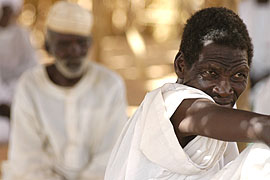
Darfur, land of the Fur. And home to some thirty other tribes and groups of farmers, stockbreeders and nomads. The region was virtually unknown a few years ago, but last year Darfur hit the headlines in a big way. Now the name is associated with violence in all its horror. A distant land propelled into the centre of international politics. A vast area with no resources to fight over, poor even by African standards, and riven by obscure and complex tensions. The scene of mass movements of population and even famine, especially in the mid-1980s. A place where help "has arrived too late and been insufficient," to quote ICRC President Jakob Kellenberger writing for the International Herald Tribune.
Failure to seize complexity
There are those who scramble to pass judgement on the conflict that has ravaged this province of western Sudan for the last two years - "Tribal conflict," "ethnic cleansing," "Arabs versus Africans," "genocide" or "struggle against marginalization." Plenty of labels, but none really grasps the reality, which is far more complex than any of them. All these appellations ignore the fact that beyond the responsibility of this, that or the other body, the one point not open to debate is that these people are suffering the effects of open or latent violence, holding on as best they can and struggling desperately to survive. The suffering is visible in the eyes of the thousands who have taken refuge in camps, or who cling to their hamlets, villages or nomadic encampments. Some observers maintain that the conflict has died down somewhat over the last few months, but the consequences remain as serious and the needs as acute as ever.
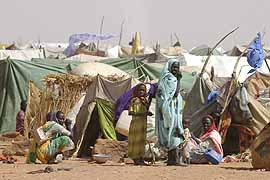
Slum camps
The African Union has sent 2,000 soldiers to ensure the security of 6 million people spread across almost 400,000 square kilometres of territory. Without wishing to judge the ability of this force (which is soon to be expanded) to do its job, the 89,000 displaced people in Abu Shok camp near El Fasher in North Darfur are nowhere near going home, and nor are tens of thousands of others in similar camps. On the contrary, many more are clamouring for entry to this huge slum-like camp of six square kilometres, with its rows of shacks covered in blue or white plastic sheeting.
Various humanitarian organizations are providing services, including medical care and schooling for children, and these go a little way towards mitigating the disastrous consequences of the mass displacements. Perimeter security reassures those who, understandably, remain traumatized by violence. A smaller camp is to be set up nearby.
In one year, the number of displaced persons registered in the province's camps has almost doubled, reaching 1.5 million by some estimates. Another 700,000 have left their homes to take refuge in neighbouring towns and villages, where they face a precarious existence.
Extending aid to isolated communities
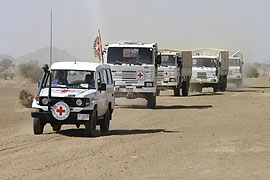
The village of Samra lies hidden in a ring of sugarloaf mountains, 165 kilometres and five hours away along the rocky, sandy roads that penetrate the picturesque region of Jebel Sir. The route passes through villages that have been burned or hastily abandoned. Today, the 3,700 inhabitants of the seven neighbouring hamlets have converged on Samra. Not surprisingly they give a warm, whooping welcome to this, one of the few organizations to venture off the beaten track and bring them a few basic necessities.
The sheikhs of the villages have drawn up lists, and the sorghum, lentils, salt and oil are distributed quickly and efficiently. The only hold-up is that the villagers would like these reassuring strangers to stay a little longer. Their poverty is unbelievable. Livestock is seen as the main source of subsistence and wealth. But most of theirs has been stolen, and it will take five to ten years to build up their herds again - assuming good millet and vegetable harvests. And agricultural output has been particularly low this year on account of the dangerous situation, the difficulty of getting into the fields, displacements and the lack of tools and seed.
Eradicating fear
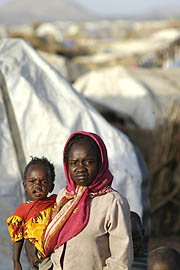
A tiny handful of humanitarian organizations - of which the ICRC is one - are helping the villagers resume normal agricultural activities. Unless they cultivate their land there will be no harvest, and they will be dependent on food aid again in 2006. Food handouts are only a stopgap solution. There is a need to help the villagers conserve their animals and to repair water points, bring in seed, run essential vaccination campaigns and ensure access to medical care.
But the most important task is to eradicate the fear of violence. ICRC delegates remind all arms bearers and political representatives of the basic rules of international humanitarian law. While respecting the ICRC's rules on confidentiality, they also report to them on violations perpetrated against the civilian population, with the aim of ensuring that these are not repeated. This protection work lies at the heart of the ICRC's action. The hope is that creating a safer environment will facilitate the resumption of agriculture and trade.
Further west
In western Darfur, near the border with Chad, nomadic communities of Arab origin have also been affected by violence and the disappearance of their resources. The violence is preventing many of them from driving their flocks to the pastures where they must graze in order to survive. Livestock is dying. Milk and meat are becoming rare. Trade is grinding to a halt. Poverty and hunger force the nomads to move to the camps - or take up robbery. For the time being, the ICRC is the only organization helping this population.
The problems of daily living are worse than ever. If proof were needed, one would need only to spend a day in Suleyah, 80 kilometres north of Juneina. Mubarak has an inflamed finger, but he is too frightened to visit "the others" for treatment, just 15 kilometres from his encampment. Saadiya is 18. She sustained two bullet wounds to the leg while out gathering firewood in the bush. For the past year, she has been waiting stoically for a humanitarian organization to take her to Juneina hospital, as her village can offer only rudimentary medical care.
Southern Sudan: could peace be infectious?
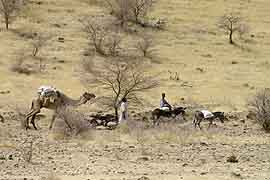
The world's attention is focused on Darfur, and southern Sudan is being forgotten. The region is enjoying a real respite from the fighting, after 21 years of violence. The peace agreement signed in Kenya on 9 January 2005 ended a devastating conflict, estimated to have claimed over a million lives and to have created 4.5 million displaced persons, plus 550,000 refugees. No-one really expected this agreement, and it has rightly been hailed as historic. It should bring about not only a more equitable division of power and resources but also the return of displaced persons, the demilitarization and demobilization of armed groups, freedom for people held in connection with the conflict and stability in the supply of essential commodities.
However, there is still a need for caution. Certain political problems remain unresolved, and southern Sudan is in an appalling state of destitution. The economic situation was already desperate, and deteriorated still further following the poor harvests of 2004. Things are now so bad that the World Food Programme is talking about a possible famine. What little water there is has to be pumped out of the ground. But the pumps are in a poor state of repair and only urban areas have electricity, and then only intermittently. The medical facilities, supported in part by international organizations, lack both resources and qualified personnel.
There are those who hope that the recent agreement could serve as a "road map" for peace in Darfur. Huge posters on all the streets of Khartoum seem to be making this point, stating that "Peace has come and suffering has departed," or calling for tolerance between "tribes and peoples," quoting a verse from the Koran.
|
|



